New Summer, New Travels, New Blog!
Hi friends!
Another year brings new travel plans in Asia -- now, I'm headed for Taiwan to spend six weeks at a university in Taichung. I'll be blogging my adventures over at
www.kelly-in-taiwan.blogspot.com. See you there!
Graduation!
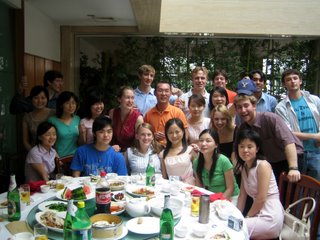
Graduation! We're done!! We have passed through the fire and emerged on the other side stronger, better people. Our lungs and our tummies have suffered from Bejing's pollution and food, our heads have ached with the pain of memorizing hundreds of characters each week, our eyes have glazed over from hours of studying and our mouths have frozen when drilled by teachers, but we have all survived. We few, we lucky few, we band of brothers, are proud to call ourselves HBA graduates and third-year Chinese students. Hooray!
After a not-so-difficult final, we all reconvened in the Yi Fu Building for closing ceremonies.
A bunch of important people (Feng Laoshi, the head of HBA, the director of the BLCU language program, etc.) and some students (including my friend Xiao Kan and my
jiejie Feng Shi (my “big sister,” or the other student assigned to my “Chinese family”)) made speeches, and we all collected our diplomas before setting off to the Hui Yi Zhong Xin for a lunch whose sub-par deliciousness was more than made up for by the fun teachers and students with whom it was shared. After lunch, a frantic scene of picture-snapping commenced, and I happily joined in the fray... the results appear below!
This is a picture of me with Feng Laoshi, the head of the entire program (and the first Chinese teacher I ever had, whose charisma was about the only thing that could have made me take his 9 am lecture class) and Shi Bing Ling (Sabrina), a Yalie and a good friend, who will be with me on my flight back home to the States!
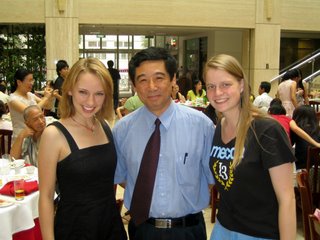
This is me with Wang Laoshi, head of the fantastic team of second-year teachers -- a strong and wonderful woman (see post below about teachers) whose tough exterior and commanding classroom presence mask an interior of kindness and motherly love for all of her students... every single one. Wang Laoshi, we love you!!
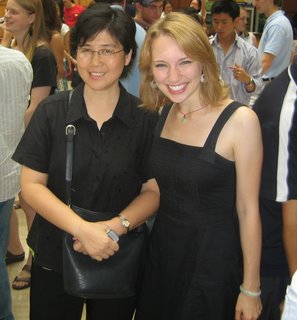
This is a picture of me with Mi Chaoyang (my friend Ned from Yale) and Kai (my friend from Harvard). Ned and I did our skit for the midterm together... he played Bachelor Number One in
Beijing Tanlian'ai de Bisai (Beijing's Dating Contest). Fun times. Kai will be living in Mather next year, and, it turns out, has been family friends with my roomate Jenn and her family since he was little!! Is it a small world or what?!?
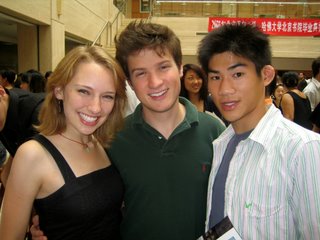
Okay, let's talk for a minute about how much I love Hao Laoshi. (It's a whole lot.) She was one of our
xiao ban ke teachers, and one of the warmest, sweetest, friendliest people I think I've ever met. She was one of the uncontested favorites among the students, loved not only for her cheery manner and sometimes un-pc jokes but (especially in my case) for her willingness to teach us the way we want to be taught. This is not to be drilled over and over again, to memorize and recite text without understanding how or why to use the new vocabulary, grammar patterns, and idioms we studied, but rather to ask questions and have them answered thoughtfully and thoroughly. Hao Laoshi did all of these things, although her temerity in doing so was unmatched by the other teachers, all of whom were instructed to drill students without stopping for questions. Her internal battle was great -- after one particularly grueling
xiao ban ke in which myself and three other students had almost unlimited questions and tangential queries about new vocabulary, she seemed almost unable to accept my thanking her after class. "Oh, He Kaili," she cried, tears in her eyes, and gave me a huge hug, explaining how much she wanted to be able to stop and explain things to us but how strictly she had been counseled not to do so. "If you have questions, during other teacher's classes, write them down, and you can ask me after class.... I am so happy to answer students' questions, but I just can't always do it during class, but I would love to help you any free time you have, just let me know...." She understands better than any other teacher the way American students think and learn, and the comeraderie with and loyalty of her students is simply unmatched. I love Hao Laoshi!!

Xiang Shan Park
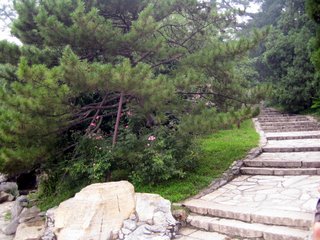
After class ended on Friday, a funny sort of feeling permeated the dorm as we all headed back to our rooms to drop our stuff and freshen up for the afternoon, realizing with some astonishment that for many of us, this Friday marked the beginning of our last real weekend in China, and there was still so much left to see. I thumbed through the green binder of
Let's Go: China photocopies Kevin left me when he went back to the states, making a mental checklist of places to see, their opening and closing times, their proximity to Beiyu and their ticket prices. Wandering down the hall, I was unsuccessful in my attempts to find people to accompany me to
Gu Gong but decided instead, after much debating and some interesting on-the-fly translations of travel guide books (as we all tried to talk to each other in Chinese about the recommendations our

English-language copies of
Frommer's, Lonely Planet, and
Let's Go gave us) to make a trip to Xiang Shan Gongyuan.
Xiangshan Park, which used to be called Jingyi (Tranquillity) Park in ancient times,is located in the southern side of the Temple of the Azure clouds at the foot of the Western Hills, northwest suburbs of Beijing. The park actually used to be an imperial retreat and hunting ground, but is today a wide, peaceful, mountainous park, laced with footpaths and mountain trails, dotted with shady pavilions and small temples. The park's name means "Fragrant Hills" (Mom: Tai Shan's "
Shan," which means mountain, and Mei Xiang's "
Xiang" which means fragrant or fragrance. Yay for Chinese language!)
So on Friday at about 3 in the afternoon, Xiao Bai (Casey), Gu Mei'an (Marion), Kong Manlan (Margaret) and I all headed out to the Wudaokou bus station to try to catch the 331 to the 792 to Xiang Shan Gong Yuan. It was a long trip, but we made it there eventually, to be greeted by a very typical sign informing us about the park. (Note the excessive use of glorfying adjectives

and slight errors in word order. I left out the bits where the sign brags about how the Chinese government has decreed this site one of national cultural value, but those are usually there as well):
"It is a mountain forest park, which utilizes the natural environment with artificial embellishment. Every pavilion, terrace, tower, pagoda, hall, loft, hill stone is made suitable for the requirement of natural scenery. Beautiful environment of the nature and various buildings at different layers are made in accordance with each other beauty, appearing in very harmonious grace."Anyway, this park was first built in 1186 in the Jin Dynasty and later extended to a slightly larger scale in the Yuan and Ming dynasties. In 1745, the emperor of the time
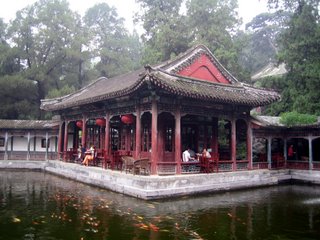
(Emperor Qianlong, if you're into Chinese history) ordered the addition of many new halls, pavilions and gardens and gave it a new name, Jingyi Garden (Garden of Tranquility and Pleasure). Unfortunately, in 1860 and 1900 after Yihe Yuan (the Summer Palace) and Yuanming Yuan (the Old Summer Palace) were set on fire, lots of relics in Xiang Shan were damaged by foreign troops. Since 1949, after more than fifty years of restoration and development by Chinese government, "Fragrant Hills Park" has been recognized as one of the ten most famous parks in Beijing and is finally a site worth visiting again, though I'm sure it will never recapture the glamour and scale it had before the pillaging and destruction of the foreign troops.
Despite all the cultural destruction that preceded us, the park was lovely. It retained an air of faded grace... a kind of dereliction tempered by beautiful natural
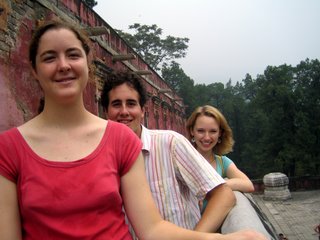
surroundings, almost as if the green vines and misty white air were hugging and healing the ruined splendor of the old temples and statues, many upended, worn away, or broken down the middle. The sense of abandonment was enhanced by the absence of large crowds and the thick, misty air and rain which kept coming and going as we strolled up and around the mountain on mossy stone paths.
[On an unrelated note: picture at right features Margaret, Casey, me. All of the kids I went with are Yalies, which is sad because they are so cool!]
One of the coolest things about Xiang Shan Park was that it literally was
hen xiang -- actually smelled good.
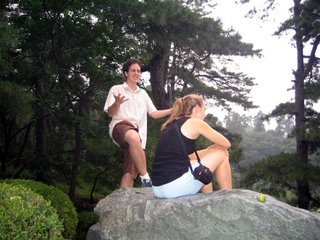
It wasn't overflowing with herbal fragrances or anything, but there was a sort of damp, nature-y air about the place... it actually smelled
green. Beijing is so short on good-smelling, green-filled spaces that this park provided a wonderful escape from the polluted haze of the city. Margaret, Casey, Marian and I had the nicest day, alternatively strolling or just sitting and shooting the breeze in Mandarin, talking about everything from our teachers to our regional accents (and how weird it's going to be when it's revealed what kind of New York/ southern/ California accents we all turn out to have once the language pledge is lifted) to the near impossibility of speaking previously-studied languages after eight weeks of Chinese immersion. (Manlan and I failed utterly at speaking Spanish to one another, lapsing into Chinese after a word or two and mixing up all our verb conjugations, though I think Casey and Mei'an had a little more luck with French. The picture above of Casey
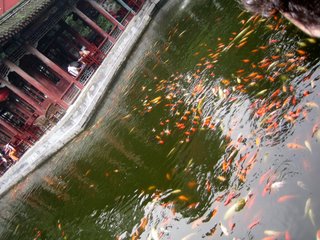
gesticulating and Marion staring pensively down at the pond is from our initial efforts to speak other languages).
It was a beautiful, peaceful, serene kind of place and a lovely end to another exhausting week of HBA. We stopped at a cafe a little later for milkshakes and brownies, then went back to Beiyu and met up with some people before heading out once more to an upscale Italian place in Chaoyang, where we almost exploded with joy after all the pizza, bread and olive oil, viniagrette salad, and red wine that this place had, providing us with yet another perfect escapist experience away from the daily grind of HBA.
Conference in Beijing

Okay, so the number one
grossest thing about killing mosquitoes has got to be when you squash them on something and rather than sort of crunching out of existence like most little black bugs they make a huge blobby red smear and you realize -- not for the first time, but always to your horror -- that the blobby mess is composed not only of mosquito innards but of
human blood which was sucked out of someone else's skin as the bug's last meal on earth. Everyone, all together now,
EWWWWWWWWWW.Anyway, can you tell news is slow in these parts recently? Of course news is slow, it's the middle of the week and every second not spent actually
in class is devoted either to eating, sleeping, or studying for the next class. (Occasionally, for added excitement, some combination of the three might be attempted, though this usually results in ice-cream-sticky notes and bad dreams filled with droning Chinese text recordings). BUT all of this is beside the point, since this post is meant to fill you in not on the humdrum details of my second-to-second existence of absorbing as much Mandarin as I possibly can, but rather on the exciting details of this past Sunday, which featured the second annual Conference of American Students in Beijing at Beijing University (
Bei Da, short for
Beijing Daxue). Students and teachers from HBA, PIB (Princeton in Beijing), Columbia, and a few other summer programs attended a speech contest for students of all levels (from second-year to fifth-year and above).
Anyone who knows me might be wondering at the fact that I attended this conference thing at all, knowing how deeply and profoundly I dislike public speaking in foreign languages. Public speaking isn't a big deal in English -- I mean, I get nervous like anyone else, but it's usually fine and can even be sort of fun -- but public speaking in other languages,
particularly Chinese, is one of the worst things on earth. Anyway, to make a long story short because this post is becoming too long already and I need to get back to studying, I was coerced against my will to attend this contest, and had to memorize and perform an essay I had
purposely not written that well because I
knew that this competition was in the offing and
absolutely. did. not. want. to. go. Moreover, on Sunday all of my friends were going to the Hidden City and Beihai Gonguan, the two places in Beijing I wanted to go to
most, and I not only missed out on fun activities Friday and Saturday night because of memorizing this stupid thing, but had to spend all of Sunday at Beida doing my least favorite thing on earth. I thought that a huge number of students were going, but it turned out that besides myself there were only three other second-year students and all three of the second year lecturers: my friends Bai Ge (Parker), Xiao Bai (Casey), and Mi Ankang (Andrew), and Wang Laoshi, Yan Laoshi, and Tian Laoshi, respectively. [Picture above, from left to right: Andrew, Casey, Parker, me.]
Complaining aside, the contest could have been lots worse. It lasted for six hours (!!) but Tian Laoshi, sensing our increasing ennui (and probably harboring some of his own) led us on a covert mission to have some fun in the area of Beijing around Beida as other students droned on with their speeches. We bought some melon from a street vendor and found our way to Zhong guan cun, often called the "Silicon Valley" of China, a technology hub I'd visited during Social Study week. We wandered around, bought some
bai jiu and some KFC, and I found a giant Sephora that was basically identical in all respects to the ones in the States, with the small difference that a salesperson who saw me eyeballing a set of powder-filled compacts asked me what color I was looking for: did I want one that was the natural color of my skin, or one that would make it a few shades lighter? Never, ever, would that question be asked of me in the States. Oh, China, and its longing for pale, pale skin. Why do I live in America, home of the golden tan?
Anyway, after hanging out and hitting the town with Tian Laoshi, we found our way back to Beida in time for the awards ceremony and dinner in a Beida restaurant, before piling into taxis back to Beiyu to begin studying for Monday's class, in the few hours still afforded us. The one good thing was that, since all three of the
da ban ke teachers came with us to the conference, they would understand if we missed a few vocab words in class tomorrow, since we were sort of busy for most of Sunday!
Temple of Confucius
I've been rather delinquent about posting these pictures... they are actually from either day one or day two (I've already forgotten!) of our social study week. We made a quick stop at the Temple of Confucius after visiting the Lama Temple (maybe that post has the date in it...?). the Temple of Confucius in Beijing is the place where people paid homage to Confucius during the Yuan Dynasty (1271-1368), Ming Dynasty (1368-1644) and Qing Dynasty (1644-1911). It was quite beautiful, but (like much of Beijing) under a great deal of construction at the time we visited, so not many pictures (and still fewer good-looking pictures) were actually taken. Sorry!

Picture of one of the outer temple buildings. This temple consists of four courtyards. The main structures include
Xian shi Gate (Gate of the First Teacher),
Da cheng Gate (Gate of Great Accomplishment),
Da cheng Hall (Hall of Great Accomplishment) and
Chong sheng ci Hall (Worship Hall).
Da cheng Hall is the main building in the temple, where the memorial ceremony for Confucius was often held. I
think this one might be the
Chong sheng ci Hall, but I am far from certain about that.
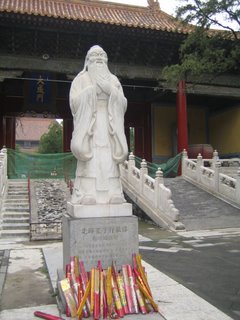
Statue of Confucius, with offerings in front and construction in the back on what I'm pretty sure is the Da cheng Gate. Confucius, or Kong fu zi (also spelled K'ung-fu-tzu under the old
Wade-Giles system) is arguably the most formative figure in China's cultural, political, and (!) philsophical history. I'll spare you all the fancy details of Confucianism here, although more than you could ever want to know about it and its relationship to the temples constructed to further its study and worship can be found in
this website.
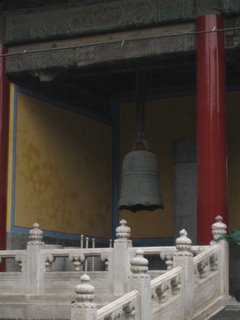
Unlike the Buddhist temples we visited, temples built to honor the spirit of Kongzi were often part of a larger system of cult sacrifices to other gods and spirits rather than reflecting worship of and devotion to a truly spiritual entity. Kongzi is regarded as a wise scholar and is unequivocally revered in China, but "temples" in his honor have nothing of the air of worship of the holy of their Buddhist counterparts.
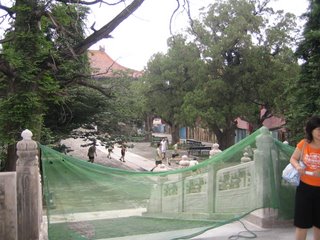 One of the funniest things about Beijing is the constant juxtaposition of a beautiful and ancient culture with a modern society which itself contains as much that is poverty-stricken and undeveloped as it does that is modernizing at a million miles an hour. This picture has it all: shirtless, shoeless, dust-coated young men, playing net-less soccer in the courtyard of one of Beijing's most ancient cultural sites, rich in philosophical and historical significance, but at present covered over with ropes, fences, and other construction-related manifestations of Beijing's full-tilt-ahead-no-holds-barred-head-long-modernizing charge into a new future.
One of the funniest things about Beijing is the constant juxtaposition of a beautiful and ancient culture with a modern society which itself contains as much that is poverty-stricken and undeveloped as it does that is modernizing at a million miles an hour. This picture has it all: shirtless, shoeless, dust-coated young men, playing net-less soccer in the courtyard of one of Beijing's most ancient cultural sites, rich in philosophical and historical significance, but at present covered over with ropes, fences, and other construction-related manifestations of Beijing's full-tilt-ahead-no-holds-barred-head-long-modernizing charge into a new future.
Longqing Gorge
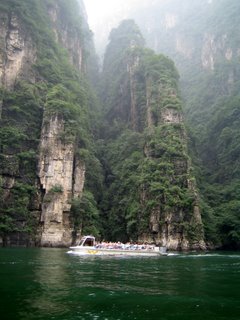
So Saturday was our big daytrip: waking up bright and early (meet outside the library at 7:15 am!) to take a two-hour bus ride 90 km away to nearby Yanqing County, where the wonders of one of northern China's most beautiful natural scenery. Longqing Gorge is a gigantic canyon, a natural wonder carefully built over to affort visitors the maximum amount of "fun" possible, replete with a 70 m high dam (see picture at left) and cascading waterfalls, a 300 m long dragon-shaped escalator (see picture at right) which carries tourists part of the way up the sides of the gorge, a number of panoramic hiking trails, a small buddhist temple (Jingang Temple) and a blessing bell, a 7 km stretch of lake trolled by tourist boats, a series of caves with slick, wet walls, and a large number of tasty restaurants, all of which I went to, in roughly that order. The pictures tell a far better story than I could put into words -- despite being nervous about having to memorize my stupid
she hui diao cha bao gao (grumble grumble grumble grrr), I had a ton of fun on Saturday, scaling the mountain with friends, admiring the stunning scenery, giving my lungs a welcome break from Beijing's fairly toxic air, and most of all gazing in awe as we rode the tour boat through the gorge's deep crevasse. It was simply gorgeous, really, truly, unbelievable... the cultural sights of Beijing are obviously unparalleled and very interesting in their own way, but getting away from historical/cultural/otherwise intellectual sight-seeing, getting away from the gritty, hazy city air and the crowded streets was a really welcome change. Enjoy the pictures!
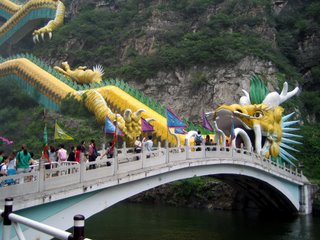
So this was the giant yellow dragon escalator. I was initially a little piqued by the lack of opportunities to "commune with nature" inside the smelly electric bowels of a giant elevator on the side of the mountain. However, my fears were more than allayed by the profusion of stairs and rocky paths higher up on the mountain.

This is the waterfall from the giant dam. The spray coming off this thing was unbelievable. My hair was very, very unhappy with all the mist, but the falls were gorgeous. The funny thing was that one of the teachers (Tian Laoshi, in fact) tried to compare these waterfalls with Niagara Falls, which he's obviously never been to. Now, admittedtly, I've never been to Niagara either, but I have a sneaking suspicion that those falls are just a little bit different from these...
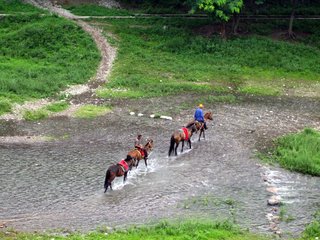
So here are two people on four horses crossing the river below the dam. Very picturesque.
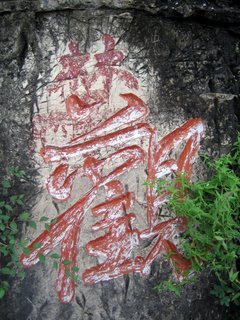
Longqiao Gorge is filled throughout with characters, names, and phrases which have been carved into the sheer rock face and painted red. While I didn't know what all the inscriptions meant, it was still sort of beautiful. They were all traditional (rather than simplified) characters. :)
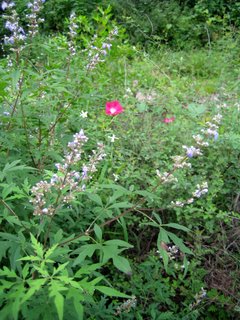
Pretty Chinese flowers... my friend from Kansas saw me taking numerous shots of the gorgeous scenery and asked if I was also a "nature photographer," and come to think of it, I guess I do tend to take photos which have scenery but no people in them, and certainly no
me in them, which is what he said his parents complain about non-stop. I have also received this complaint from friends at home... hmm...

Gorgeous,
gorgeous scenery. This was from the boat. It was so unbelievable.
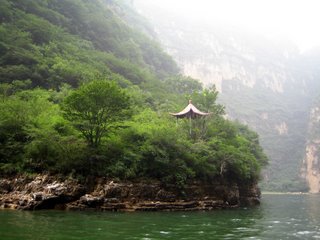
Also on the boat... a pretty pagoda.
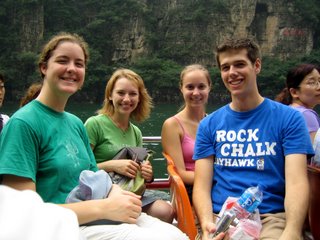
Yay! Look! A picture with people in it! From left to right: Kong Manlan, me, Gu Mei'an, and my friend from Kansas whose Chinese name I do not know (
bu hao yi si!).
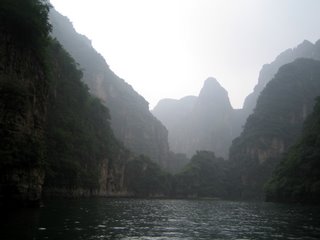
Like I said, the scenery was just breathtaking. I have about 8 thousand (okay, 65) other pictures of this place, but I can only upload so many shots to a single post. Such a fun day trip!
Just some thoughts
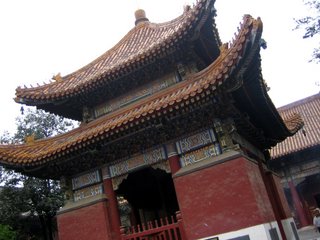
I think one of the weirdest things about China is that it’s the first place I’ve ever been that I will be in a fundamental way unable to share with my family. I mean, that’s basically the purpose of this blog – to be able to let folks back home what I’ve been up to, to show pictures and insights and funny little things I’ve noticed about the life in Beijing, without actually being here – but at the same time it’s just odd to think that this place right here, this little space mapped out in my mind, these frequently-trodden paths and frequently-seen sights will never be more than stories or details lovingly recounted but imperfectly imagined. It’s not something I’ve ever had before, and it’s oddly unsettling. Living away from home for any extended period of time away from my family always involved their presence for at least part of the experience: Providence, RI; Central Square, Cambridge, MA; Wigglesworth, Cabot, and now Adams House at Harvard – these are all places I’ve lived and made my own, all locations whose little details are, for better or for worse, inextricably bound up in the story of my past.
I find myself often wanting to show my family things I see and do here… Watching as a beautiful long-tailed bird hops from curb to street and wanting to show it to my dad, to ask him about the soft blue plumage and black-tipped wings, to hear from him its name and seasonal migratory patterns … and even when it strikes me that he might not know the bird’s name (do Chinese birds even have English names? I suppose…) or habits, the desire to show him something new that we both enjoy is instantly quashed when I realize, suddenly, that I will never be able to show him this bird, that he will probably never see one, at least not here, with me, in China. Or, trying a delicious new flavor of ice cream that my mom would just love, and realizing with a jolt that, unless some Asian grocery store seven thousand miles away on the other side of the globe happens to sell this same kind, I will actually never be able to give it to her.
Subconsciously, I find myself making little lists of things to do with my sister when she comes to visit, something I do all the time in Cambridge because there, obviously, she actually does come to visit me rather frequently, but which remains a simple impossibility here. I can’t drive away the persistent underlying assumption – perfectly valid at school – that it’s been a while since I saw them so it must be true that my family is due for a visit, no matter how many times I realize that obviously isn’t true. I guess that’s part of why I started this blog anyway: because while I have a whole group of great friends here, and (in a sense) a kind of big family of Chinese teachers here, (including about fourteen new “moms,” three “dads,” and two “big sisters,” [which is new because I’ve never had that before, I’ll admit I kind of like it, although obviously nothing could ever compare to my actual sister]), there’s never been a truer case of “never the two shall meet” than this one.
In two weeks, I’ll go back to America. Aside from a handful of students and three teachers who will also be teaching at Harvard in the fall, none of these people will be part of my life back home again, and absolutely none of them will ever have anything to do with my home home on Long Island. Most of my friends will go back to their respective universities (Yale mostly, three to UChicago, and one to Kansas State), and all our teachers will stay here in Beijing. Here in China they’ll stay, living the only life they’ve ever known, which we foreign students have shared with them for nine brief weeks before moving on, guests returning home, this summer course a shared blip in a series of lives whose courses are otherwise about as far removed from each other as it is possible to be.
A short post about weather
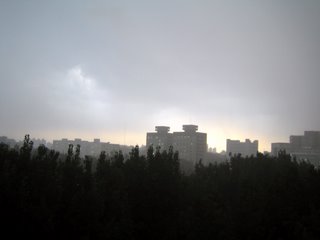
The weather here in Beijing has been nothing short of absurd lately. Apparently this city had about two weeks of good weather during the beginning of this summer, but exactly three days after I arrived (three gorgeously warm and sunny days, as I recall) the weather decided it was having some maladjustment issues and has been acting strange ever since. The day is either sunny, humid, and insufferably hot -- like, in the 100s *F -- or overcast, even more humid (stepping outside is like being hit in the face with a warm sponge), and about to rain at any moment. Now, so far my favorite weather is of the second kind -- the sky is greyish-white, the air hazy, damp, and opressive, the weather overall warm and somewhat ominous but not too threatening -- until, that is, it starts pouring.
Yesterday, for instance, after walking to
da ban ke at 8am under skies which were their usual hazy grey color, I was shocked to see that, just ten or fifteen minutes after starting class, the windows of our classroom were as dark as if it were 8pm, literally. Actually, maybe like 9 or 10pm. It was
dark. A wind was whipping the trees, which appeared almost to move in slow motion through the thick, humid, air. The dark ashy greyness of the sky seemed palpable (actually, it probably was, in the form of air pollution), and within minutes thick, hard drops of water came pelting down from against the windows and ground. By the time we had our first morning break 45 minutes later, the outer terrace of our classroom was utterly flooded, the ground beneath our fourth-floor windows covered in uneven puddles of unknown depth thanks to Beijing's virtually nonexistant drainage system. Yet, by the time lunchtime rolled around just three hours later, the rain had let up to a moderate drizzle, and we picked our way through pond-like puddles back to the dormitory to change clothes and shoes.
By the next day (today) the sky had hardly a cloud within it, and the bright sunlight was nearly insufferable after about two minutes outside. Yet as I began typing this, although the day was still bright, it began raining rather hard again. And by now it has stopped, the sky still hazy and clouded as it makes up its mind about what to do next, the wind rustling the treetops below my window where a few birds have optimistically resumed their chirping after the sudden storm. What will happen next? Only the weather gods of Beijing know for sure. Actually, I have a feeling they don't know either.
HBA Teachers: A Brief Introduction
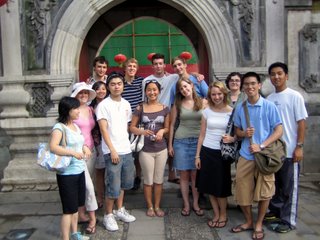
I'm planning to make this post a bit longer eventually... right now I've only got the head honchos covered here, but I'd eventually also like to introduce you to our
xiao ban ke and
dang ban ke teachers. Not sure how possible this is, given how very many teachers we have, but, hey, I can dream. :)
Feng LaoshiFeng Laoshi is the head of HBA, benevolent father figure with a reputation for almost fanatical enforcement of rules (most notably our Language Pledge, which forbids students from using any language other than Chinese except in dire emergency situations and when speaking to family back home -- and even then, only out of earshot of other students).
Yan LaoshiYan Laoshi is like a friendly little panda bear who just wants to hug you and love you and teach you lots and lots of good Chinese. Her kind manner and chirpy voice belie a formidable intellect and a fierce strictness -- students lucky enough to find themselves under her tutelage are almost incessantly corrected in their grammar, pronunciation, phrasing, and so on, but mind far
less than they normally would. If you ask Yan Laoshi to explain a grammar point to you, you will not only receive a thoughtfuland precise answer but will find yourself tested on it -- probably in sentences involving recently-studied grammar patterns and this lesson's new vocab words -- several times in a row, gently corrected until you've got it perfectly down.
Wang LaoshiWhile Yan Laoshi rules her Chinese classroom on charm and perkiness, Wang Laoshi rules with the old "iron fist in the velvet glove." As I've never had the occasion to observe anything less than perfect classroom behavior from anyone at HBA (literally, never, it's a little creepy what good little boys and girls we are), I don't know how (or if) Yan Laoshi would cope with problems in the classroom. I have no such reservation about Wang Laoshi -- in her classroom, she is the law. A tall woman, whose lazy eye and mild duck-footedness somehow do not detract from her stateliness, Wang Laoshi is apparently the only teacher not deathly afraid of Feng Laoshi, and apparently calls him by his first name and tells him he's talking rubbish if she thinks he is. I would imagine that Wang Laoshi is a bit like the Chinese version of the Unsinkable Molly Brown,
with a great stentorian voice and a jovial, if autocratic manner. She is, as my mom would say, "a big softy" on the inside, who cares deeply about her students and their well-being as well as their Chinese skill. Still, I would not want to cross Wang Laoshi.
Tian LaoshiTian Laoshi is the only male da ban ke teacher, and lags somewhat behind the other two in terms of teaching method, ability to explain tricky concepts, and overall style. I don't blame him, of course -- he's the newcomer, and the other two teachers weren't born with those skills, so he's got time. His pronunciation is less than clear a good deal of the time, which is a pretty big
flaw in a foreign language teacher, particularly one teaching Chinese, as writing the character on the board for us does nothing if we don't know how to say it properly. During dictation this is also a pretty big drawback. However, he's quite good at explaining things, most notably one-on-one, as his classes are invariably about three times more boring than the others' classes, and sometimes begin to drag. However, he's a good guy -- I think he's on his way.
Beijing Planning Exhibition Hall
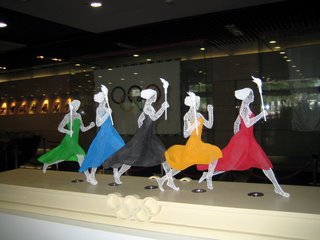
So on Wednesday we went to the Beijing Planning Exhibition Hall, which is an enormous complex filled from top to bottom with exhibits of Beijing's architecture and city planning for all its various districts. The coolest part of the museum was probably the eastern section of the third and fourth floors, which features a huge aerial photograph 10 times as big as the average Beijing apartment. The photograph is printed on nearly a thousand lit glass floor panels and features a middle section with many districts of the city built in tiny scale models complete with flickering lights and color-coded sections. There is a picture of it below -- truly very cool. More information about this exhibit in particular can be found
here.
The entire first and second floors of the museum, however, were entirely devoted to exhibits concerning the coming Olympics -- plans for sculpture and architectural
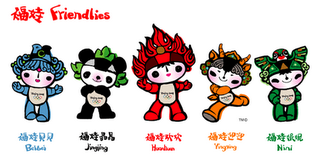
planning were everywhere. All this Olympic stuff got me thinking about the adorable
mascots China has designed for the 2008 Games. Although not prominently featured in the Exhibition Hall, these little guys (
Fuwa) are simply everywhere you go in the city -- people are selling them as keychains, posters are on the sides of buildings and athletic centers, taxi drivers have them as little figurines dangling from the winshield or perched precariously on the dashboard.
So much media exposure (besides having the desired effect of me thinking that the mascots are cool,
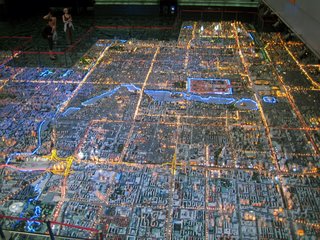
that Beijing has got its act together for the Olympics, and that it would be sort of cool to come back here in 2008 to watch the Games) go me thinking, for no reason whatsoever, which of the mascots reminds me of which of my family members. Well, okay, it's not no reason whatsoever -- big motivating reason number one is that I miss my family and think about them a lot, and minor auxiliary reason number two is that Yingying
really reminds me of my dad, and Nini sort of reminds me of my sister.
Anyway, the
link above has more information about these five cute little guys than you would probably ever want to know, so I can spare you all the details, but it's really kind of amazing how well-thought out the whole "Olympic Mascot" thing is for Beijing. They manage to incorporate not only the colors of the five Olympic rings (blue, black, red, yellow, green); five different symbols of Chinese culture/the Olympic games (fish, panda, Olympic torch, antelope, Chinese kite); five different blessings (prosperity, happiness, passion, health, and luck); five different regions' cultural art forms; they also have a message hidden in the cute di-syllabic names typical of Chinese children (Beibei, Jingjing, Huanhuan, Yingying, and Nini come together to form the phrase
Bei jing huan ying ni, or "Beijing welcomes you"), and, given their familial relationship,
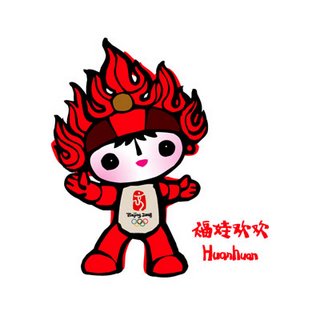
also typify the importance of family in Chinese culture.
Have I left things out? Oh, yes, there is even more -- I haven't gone into the characters of their names, which have more to do with their blessings than with their relation to the welcoming message, since the characters of Beibei are not the
bei of Beijing (Beibei's name contains two characters developed from the ancient pictograph of a cowrie shell, which used to be used for currency in ancient times and is now found in many Chinese characters having to do with money, whereas the
bei of Beijing is drawn quite differently and means "north" or "northern," and so on), nor into their particular characters: who is the oldest and youngest among them, what their personalities are like, and which Olympic sports they do best. It's really nothing short of astounding. But I digress. Widely. As usual. :) But aren't they cute?


































